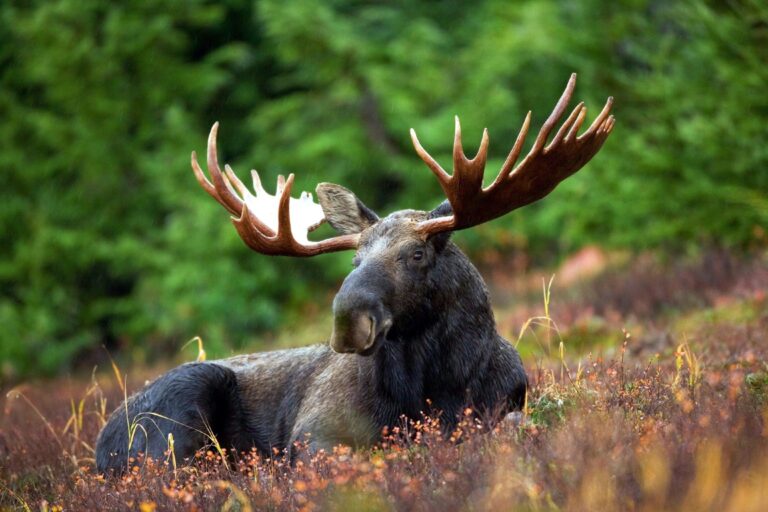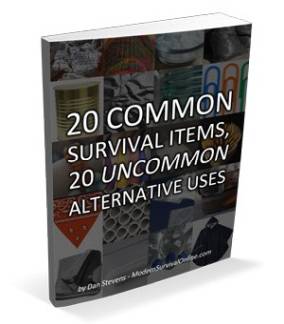There are all kinds of different deer species to be found around the globe, and many of them right here in North America. But standing over, literally and figuratively, the whitetails and elk on the continent we have the moose.

Moose are the largest deer species in the world, and though they tend to keep to themselves in the deeper and more remote parts of the wilderness, it’s hardly uncommon to encounter them close to human habitation in these areas. But, like all deer, moose only eat plants.
That means they are friendly, right? Actually, are moose dangerous?
Yes, moose are extremely dangerous when provoked, and lead the charts on wild animal attacks on people. Moose are very strong and extremely heavy, and males have enormous antlers that can do tremendous damage.
If you didn’t know any better, and you were observing a moose from a safe distance, you’d probably think they were just the same as any other grass-eating mammal.
They’re slow, almost delicate in their movements, and they don’t look like they would hurt a fly.
But come too close to one, and especially too close to a cow with young, and you’ll be lucky to get away with your life.
I’m telling you right now to stay well away from every moose you see, but there is more to learn, so keep reading.
Moose Overview, Temperament and Habitat
Moose, and yes, that is the plural usage, not “mooses,” are humongous mammals, and among the largest mammals in North America.
And even though they are strictly herbivores, they still have incredible energy requirements and so pretty much anytime you encounter them you can expect to see them eating if they aren’t resting.
But when you see a moose, chances are very good you will see only one, or else see a mother with her calf.
Moose aren’t particularly social, and though it is not unheard of to see larger groups of moose living and traveling alongside one another, this is only typical during mating season which occurs in the fall.
It’s also during this time when you will see male moose battling for supremacy and access to as many females as they can get to. The following clashes are loud and legendary.
It is also during this time and the time after when cows are with their young that moose are at their most dangerous.
During mating season, males deliberately starve themselves as they fight for supremacy and travel to find females. They are also, naturally, full of testosterone and have hair-trigger tempers.
Female moose can be even worse, flying off the handle at the slightest provocation or even suspicion that something might endanger their young calf.
In all cases and under all circumstances, if you see a moose in the wild or even one that’s coming close to areas of human habitation you must keep as wide a distance as possible to avoid provoking it.

Do Moose Protect Their Territory?
Moose are not territorial, per se, and they won’t necessarily attack a creature, including a human being, just because it is in the area where they live.
But, you might say that moose definitely don’t appreciate personal space invaders. If you come too close, a moose is highly likely to get agitated and attack.
To make matters worse, what any given moose considers to be its “personal space” will vary depending on the individual. You might not have to get too close to a particular moose for it to take notice and try to run you off.
Again, and you’ll hear me say it continually throughout this article: always stay well away from moose!
Do Moose Act Aggressively Toward Each Other?
Yes. During the mating season, sexually mature males will clash in displays of titanic aggression for dominance.
Their bellowing calls combined with the incredible racket their locking antlers make make a pretty good show.
Females also don’t care for any other moose whatsoever being nearby when they have young.
Keep in mind that any moose you encounter might already be adrenalized and agitated from a close encounter with its own kind.
Do Moose Threaten People?
Yes, very regularly as it turns out.
Although generally non-aggressive, meaning they don’t go out of their way to attack people, a moose will become agitated and defensive very quickly if you come too close to it, and even if they seem calm they can go from “gentle” to “mental” in a split second.
They are known for being temperamental!
Moose are also known for getting aggressive in areas where people feed them regularly.
You don’t need me to tell you this is a very bad idea as a rule, but moose more than other animals are known for becoming hostile if denied food by human beings. This never leads to a good outcome.
Have There Been Recorded Moose Attacks on People?
Yes, many. In fact, historically, there are too many to count!
But even looking in the past few decades of our own era, we see that moose injure more people year in and year out than most other wild animal species combined. Among large mammals, they’re at the very top of the charts.
In fact, moose are known to be so ornery that globally the only other mammal that injures more people yearly is the hippo – another legendarily surly critter.
Plus, you might be surprised to know that deer and moose kill over 400 people every single year in the U.S. alone.
What Will Trigger a Moose Attack on a Person?
The number one cause of moose aggression towards people is coming too close to a moose voluntarily, or inadvertently surprising one at close range.
This is especially true in the case of a sexually mature male or a female with young.
The next leading cause of moose attacks on people is denying the moose food in areas where they are known to be fed by stupid tourists.
Just How Strong is a Moose?
Incredibly strong. Your average mature male moose is about as big as a pickup truck, and they stand well over 6 feet (1.8 meters) tall at the shoulder.
These massive, bulky animals require an equivalent amount of muscle in order to move, and believe me they can move quickly when they want to!
The impact of a charging moose would be terrible, and they can thrash you with their antlers so hard they can nearly knock your limbs off.
Can Moose Bite?
Yes, but they’re unlikely to. It isn’t out of the question that a moose might bite you, but that isn’t their primary means of offense or defense.
What Does a Moose Attack Look Like?
A moose attack will usually begin with a threat display, giving an aggressor or potential predator notice that the moose is on to them and is not happy.
Watch for the moose to lay its ears back, lower its head, glare steadily at you and finally stand up the long, bristly guard hairs on the back of their head and neck- much like a cat will.
After this, the moose is going to charge. A moose will lead with its head, whether or not it has antlers, and simply ram you to the ground.
Since a moose can run quite quickly considering its bulk, this usually has the impact of a car wreck. After this, the moose will thrash, kick and stomp until it is convinced you are no longer a threat.
Any one of these attacks can prove fatal, and serious injuries are common though fatalities are comparatively rare.
How Do You Respond to a Moose Attack?
Assuming you see the moose coming, your very best defense is to run away as quickly as you can and put something sturdy between you and the moose.
That’s really your only defense assuming you don’t have a weapon capable of bringing it down, and your chances of employing one against a charging moose that takes you unaware are slim.
But, assuming you cannot get away in time or protect yourself from the moose reaching you, your best bet is to get on the ground, ball up, and protect your head and neck.
The moose is going to beat on you pretty good using hooves and head, but most of these attacks don’t last very long.
Once the beating stops, lay still and keep quiet until you are sure the moose has moved on… They have a tricky habit of waiting nearby after dispatching a threat to see if you are still, in fact, alive.
Once the attack is over, get out of the immediate area and away from the moose as quickly as you can.
Will a Moose Eat a Person?!
No. Moose are strictly herbivores, and they won’t eat someone even if they find them dead. They definitely won’t attack you with the intention of eating you.
Can People Catch Diseases from Moose?
Yes, it’s possible. Moose are known vectors of various diseases that can potentially be transmitted to people through close contact, through the handling of dead moose, or the consumption of moose meat.
Some of the most well-known include Lyme disease, salmonella and cryptosporidiosis.

Like what you read?
Then you're gonna love my free PDF, 20 common survival items, 20 uncommon survival uses for each. That's 400 total uses for these dirt-cheap little items!
We will not spam you.